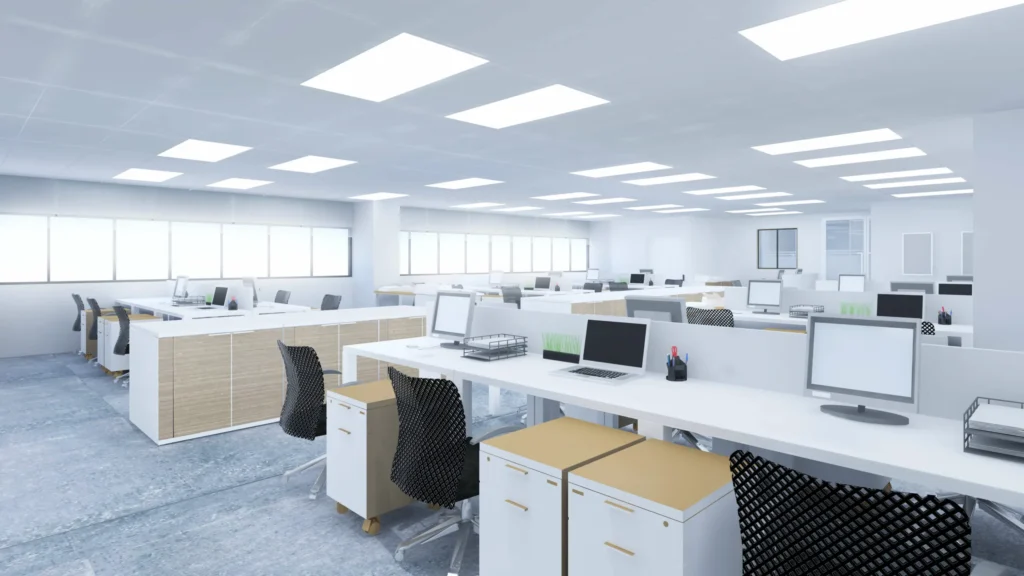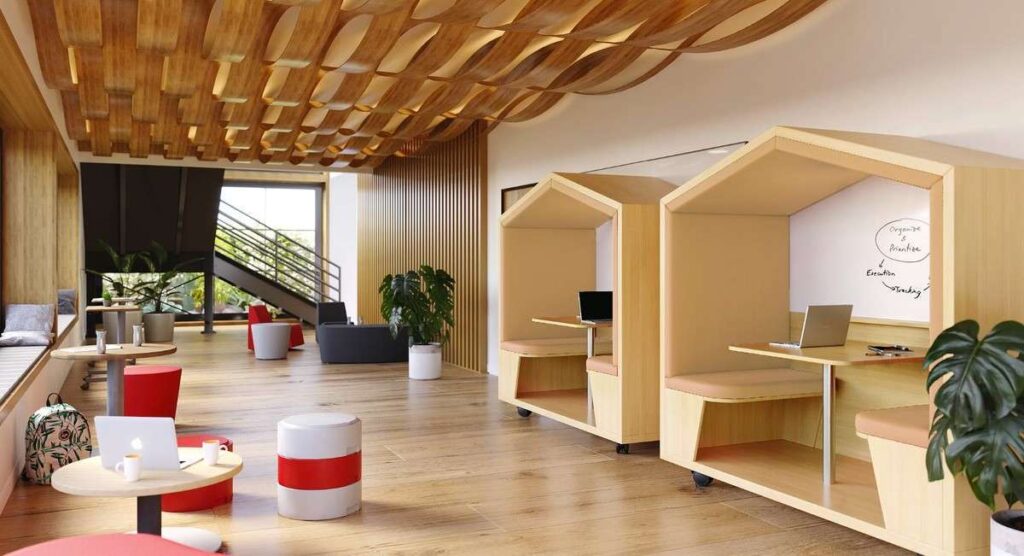Thinking about choosing a traditional office for your startup? Before you commit, explore whether this classic setup aligns with your vision, growth goals, and the dynamic demands of a new business. With flexibility, costs, and team needs at play, the decision isn’t as straightforward as it seems.
In this article, we’ll dive into the pros and cons of traditional offices for startups, compare them to modern alternatives like coworking spaces, and help you determine the best fit for your entrepreneurial journey. Don’t miss out—your workspace could be the key to unlocking your startup’s full potential!

The Entrepreneurial Journey
Embarking on the entrepreneurial journey is a significant step for individuals transitioning from a corporate environment to entrepreneurship. It involves breaking away from the conventional corporate structure and venturing into the dynamic world of startups. As one navigates this transition, understanding the intricacies of shifting from a corporate job to running a startup is vital for success.
Transitioning from Corporate Life to Entrepreneurship
Transitioning from corporate life to entrepreneurship is a transformative process that requires a shift in mindset and approach. Leaving behind the familiar corporate setting and stepping into the realm of startups can be both challenging and exhilarating. It involves shedding the constraints of a traditional office environment and embracing the autonomy and creativity that come with starting your own business.
For those making the leap from corporate to startup life, the journey is often marked by a sense of freedom, self-reliance, and the opportunity to pursue one’s passion with unrestrained creativity. This transition is not merely a change in occupation but a profound shift in lifestyle and perspective.

Importance of Choosing the Right Workspace for Your Startup
Selecting the right workspace for your startup is a critical decision that can significantly impact the success and growth of your business. A conducive workspace can foster creativity, collaboration, and productivity among team members, driving innovation and success. Whether opting for a traditional office setup or considering alternative workspaces like coworking spaces, the choice of workspace plays a vital role in shaping the culture and dynamics of your startup.
As you navigate the entrepreneurial landscape, evaluating whether a traditional office setting aligns with your new business venture is essential. By assessing the pros and cons of traditional offices for startups and considering the needs of your team and workstyle, you can make an informed decision that sets the stage for a thriving and dynamic startup environment.
The entrepreneurial journey is a unique and rewarding experience that requires careful consideration and strategic planning, especially when it comes to selecting the right workspace for your startup. By understanding the nuances of transitioning from corporate life to entrepreneurship and the significance of workspace selection, you can set your startup on the path to success and growth.
Understanding Traditional Offices
Venturing into the realm of workspace choices for startups, it’s crucial to first grasp the essence and attributes of traditional offices before diving into the comparisons with alternative options.
Definition and Characteristics of Traditional Offices
Traditional offices refer to conventional physical workspaces where employees gather to carry out their tasks under a centralized organizational structure. These offices are typically leased or owned by a company, providing dedicated spaces such as cubicles, private offices, meeting rooms, and common areas for employees to work and collaborate.
The key characteristics of traditional offices include:
- Fixed physical location
- Hierarchical layout
- Permanent fixtures and furnishings
- Regular working hours and routines
- On-site supervision and management oversight
Understanding the fundamental nature of traditional offices lays the groundwork for evaluating their suitability for startups in the modern business landscape.
Pros and Cons of Traditional Offices for Startups
Before committing to a traditional office setup, it’s essential for startup founders to weigh the advantages and challenges associated with this conventional workspace model.
| Pros of Traditional Offices | Cons of Traditional Offices |
|---|---|
| Pros: | Cons: |
| – Professional atmosphere conducive to focused work | – High initial investment in office setup and furnishings |
| – Centralized space for team collaboration and communication | – Long-term lease commitments may limit flexibility |
| – Establishes a physical business presence for clients | – Potential for high overhead costs, including utilities and maintenance |
| – Promotes a sense of organizational culture and identity | – Limited scalability in terms of space and resources |
| – Enables direct supervision and leadership oversight | – Restricted opportunities for remote work and flexible schedules |
By carefully considering the advantages and drawbacks of traditional offices for startups, entrepreneurs can make informed decisions regarding the most suitable workspace for their new business venture. Exploring comparative analyses, such as coworking space or traditional office? how to choose, can provide valuable insights into finding the optimal work environment that aligns with the unique needs and aspirations of their startup journey.
Assessing Your Startup Needs
Before embarking on the journey of setting up your own startup, it’s crucial to assess your business needs and determine the most suitable workspace for your new venture. This involves identifying your specific business requirements and considering factors such as your work style and team dynamics.
Identifying Your Business Requirements
To determine whether a traditional office is the right fit for your startup, start by evaluating your business requirements. Consider the nature of your business, the industry you operate in, and the space needed to conduct your operations efficiently. Assess whether a traditional office setup aligns with the image and culture you want to establish for your startup. Conducting a thorough analysis of your business needs will help you make an informed decision regarding your workspace choice.
Considering Your Workstyle and Team Dynamics
Another essential aspect to consider when assessing your startup needs is your work style and team dynamics. Reflect on how you and your team prefer to work – whether collaboratively in a shared office space or independently in a more secluded environment. Evaluate the level of interaction and communication required among team members and determine how a traditional office setting or an alternative workspace, such as a coworking space or virtual office, can support your work dynamics.
Understanding the unique blend of work style and team dynamics within your startup is essential for creating a productive and harmonious work environment. By considering these factors, you can align your workspace choice with the ways in which you and your team operate most effectively.
By carefully assessing your startup needs, including your business requirements and work style preferences, you can make an informed decision on whether a traditional office is the best workspace solution for your entrepreneurial journey. Take the time to evaluate these critical aspects and tailor your workspace choice to suit the unique needs and goals of your startup.
Exploring Alternatives to Traditional Offices
In the realm of workspace options for startups, traditional offices are not the only choice on the table. For entrepreneurs seeking flexibility, collaboration, and cost-effective solutions, exploring alternatives like coworking spaces and virtual offices can open up a world of possibilities.
Coworking Spaces as a Flexible Option
Coworking spaces have gained popularity as dynamic environments that cater to the needs of startups and independent professionals. These shared workspaces provide a vibrant community where individuals from diverse backgrounds can come together to work, network, and collaborate.
One of the key advantages of coworking spaces is the flexibility they offer. Startups can choose from a range of membership options, from hot desks for occasional use to dedicated workstations for more consistent presence. This flexibility allows entrepreneurs to scale their workspace according to their business needs, without being tied down by long-term leases or hefty upfront costs.
Moreover, coworking spaces foster a culture of innovation and creativity. By working alongside like-minded individuals, startups can benefit from organic networking opportunities, knowledge sharing, and potential collaborations. This collaborative environment can spark fresh ideas, drive motivation, and enhance the overall productivity of the team.
When considering the transition from a traditional office to a coworking space, it’s essential to assess your specific business requirements, workstyle preferences, and team dynamics. Understanding how your startup operates and thrives can help determine if a coworking space aligns with your vision and goals.

Benefits of Virtual Offices
Virtual offices offer another alternative to the traditional brick-and-mortar setup, especially for startups looking to establish a professional presence without the physical constraints. A virtual office provides a range of services, such as a prestigious business address, mail handling, phone answering services, and access to meeting and conference facilities on an as-needed basis.
The primary advantage of a virtual office is the flexibility it provides in terms of location and business operations. Entrepreneurs can maintain a professional image without the high costs associated with leasing physical office space. This setup is particularly beneficial for startups with remote teams or those operating in multiple locations, as it enables seamless communication and coordination.
Additionally, virtual offices can help startups reduce overhead expenses, as they eliminate the need for dedicated office space, utilities, and maintenance costs. By opting for a virtual office, entrepreneurs can allocate their resources more efficiently, investing in growth opportunities rather than fixed infrastructure.
As you evaluate whether a traditional office suits your new business, it’s essential to weigh the advantages and disadvantages of each workspace option. Understanding the unique benefits of coworking spaces and virtual offices can guide you in making an informed decision that aligns with your entrepreneurial journey.
Financial Considerations
When evaluating whether a traditional office is the right choice for your new business, considering the financial aspects is paramount. This section delves into the cost analysis of traditional offices and the importance of budgeting for workspace and overhead expenses.
Cost Analysis of Traditional Offices
Traditional offices often come with fixed costs that can significantly impact a startup’s budget. These costs include monthly rent, utilities, maintenance fees, insurance, and property taxes. Conducting a thorough cost analysis is essential to understand the financial commitment involved in leasing a traditional office space.
| Expense Category | Cost Range |
|---|---|
| Monthly Rent | $X – $Y |
| Utilities | $Z |
| Maintenance Fees | $W |
| Insurance | $V |
| Property Taxes | $U |
By quantifying these expenses, entrepreneurs can assess whether they align with their financial projections and capacity. Additionally, factoring in potential fluctuations in expenses allows for a more accurate assessment of the financial implications of choosing a traditional office.
Budgeting for Workspace and Overheads
Budgeting for workspace and overhead expenses is a critical step in ensuring the financial sustainability of a startup. Apart from the fixed costs associated with traditional offices, startups must also consider variable expenses such as equipment purchases, office supplies, IT infrastructure, and staff salaries.
| Expense Category | Monthly Budget Allocation |
|---|---|
| Equipment Purchases | $A |
| Office Supplies | $B |
| IT Infrastructure | $C |
| Staff Salaries | $D |
Creating a detailed budget that accounts for all workspace and overhead costs enables entrepreneurs to make informed decisions about whether a traditional office is financially viable for their new business venture.
To determine the optimal workspace solution for your startup, it’s crucial to weigh the financial implications of a traditional office against the benefits of alternative workspaces such as coworking spaces and virtual offices. By analyzing the cost considerations and budgeting effectively, entrepreneurs can make a well-informed choice that aligns with their financial objectives and business requirements.
Making the Decision
When it comes to selecting the right workspace for your startup, the choice between a traditional office and alternative workspaces such as coworking spaces or virtual offices plays a crucial role in shaping the future of your business. By weighing the options and considering the specific needs of your startup, you can determine the best workspace fit for your entrepreneurial journey.
Weighing the Options: Traditional Office vs. Alternative Workspaces
Traditional Office: A traditional office provides a dedicated space for your business, offering a sense of stability and ownership. It allows for customization and branding tailored to your company’s identity. However, traditional offices often come with higher overhead costs, long-term lease commitments, and limited flexibility in terms of scaling up or down as your business evolves.
Alternative Workspaces:
- Coworking Spaces: Coworking spaces offer a flexible and collaborative environment where startups can interact with other like-minded professionals. They provide access to shared amenities, networking opportunities, and a more cost-effective solution compared to traditional offices. However, coworking spaces may lack privacy and customization options as they are shared among multiple businesses.
- Virtual Offices: Virtual offices provide a professional business address and communication services without the need for a physical space. They offer flexibility, cost savings, and the ability to work remotely. However, virtual offices may lack a physical presence for client meetings and team collaboration.
By assessing the unique advantages and limitations of traditional offices and alternative workspaces, you can determine which option aligns best with your startup’s goals, values, and operational requirements.
Finding the Best Workspace Fit for Your Startup
When navigating the decision-making process, it’s essential to evaluate your business needs, workstyle preferences, and team dynamics to identify the most suitable workspace for your startup. Consider the following factors:
- Budget: Compare the cost analysis of traditional offices with alternative workspaces to determine the financial implications for your startup.
- Flexibility: Assess the level of flexibility offered by each workspace option in terms of lease agreements, scalability, and adaptability to changing business demands.
- Collaboration: Evaluate the collaborative opportunities available in traditional offices and alternative workspaces to foster creativity, innovation, and networking within your team.
- Brand Image: Consider how each workspace option reflects your brand identity, culture, and values to create a productive and inspiring work environment.
By carefully weighing these factors and exploring the diverse workspace options available, you can make an informed decision that sets the foundation for your startup’s success and growth.